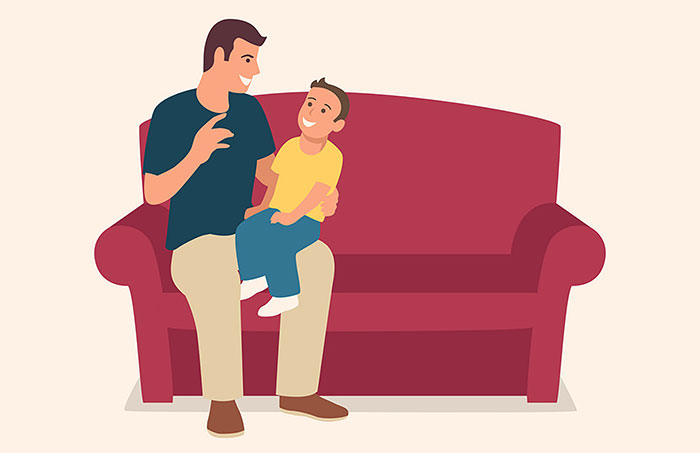There is a wealth of advice offered in every aspect of life, but do those who share it truly want to receive advice from listeners, and are all pieces of advice always helpful?
What to Know When Giving Advice
Types of Advice
- Advice telling someone what they should or must do.
- Advice against – telling someone what they shouldn’t do.
- Advice that provides information and options on a specific topic that the decision-maker may not know, without telling them what to do or not do.
- Decision-support advice – guidance on the decision-making process to help someone decide.
When it comes to advice in the workplace, instead of calling it advice, we might refer to it as feedback and sometimes constructive criticism. This term is also used in business, education, and institutions. There is both positive and negative feedback, categorized into three types: positive feedback, negative feedback, and constructive feedback.
- Positive feedback focuses on what someone is doing well, praising and reinforcing that behavior.
- Negative feedback focuses on criticisms of someone or some behavior, often becoming judgmental or opinionated.
- Constructive feedback provides specific information, focuses on the issue, and is based on observations.
First, we will consider advice within ordinary social relationships rather than advice related to work (feedback).
The Psychology of Advice Givers
Giving advice is a very natural human behavior. It is instinctive to want to offer advice. It makes us feel better. We are social beings, programmed to share our experiences and stories, which enables us to help and create change. Even when friends, loved ones, or family members come to us with their problems and complaints, we feel it is natural and the right thing to do.
We also have the opportunity to showcase our skills and knowledge when giving advice. And we want to feel that these contributions have a purpose greater than the everyday aspects of our lives.
Of course, when giving advice, people generally have good intentions. However, this can often do more harm than good for the advice recipient. If your friend comes to you for advice, there is nothing wrong with providing it. We will discuss unsolicited advice – giving advice when the recipient does not want or ask for it, regardless of whether they “need” it or not.
“People take different paths seeking fulfillment and happiness. Just because they’re not on the same path as you doesn’t mean they’re lost” – Dalai Lama.

If they didn’t ask, they probably don’t want your advice. (Illustrative image).
Reasons We Shouldn’t Give Advice Unless Asked
They Don’t Want Your Advice
If they didn’t ask, they probably don’t want your advice. Often, they simply need someone to listen; they may already know what to do, or they might not need to make any decisions at all.
An online survey asked people if they wanted to hear advice when it was unsolicited. The three response options were 1) no, 2) yes, and 3) only from the right person. Out of 847 respondents, 56% said no, 6% said yes, and 38% chose option 3.
It may not be about the right person but rather about the right approach and context.
When giving advice, you assume that the person lacks knowledge or ability.
This can be offensive to many, as they may feel belittled.
It May Seem Like You’re Seeking Control
When someone is concerned about your health, for example regarding weight, they may want to advise you to pay more attention to your weight and health and suggest ways to lose weight. Even if that friend has never mentioned weight issues to you, they are imposing their desire for change on you. This is what they want, not necessarily what you need.
Since this is not what the person desires, it can come across as a form of control. You want them to listen to you and do what you say. This does not mean you are seeking power when giving advice; it’s just that you may be unaware of this and genuinely want what’s best for them. There are healthier ways to provide support than giving unsolicited advice, as it reflects a lack of communication, management skills, and empathy.
It Comes from a Limited Perspective
We may not have any knowledge or experience in dealing with depression, terminal illness, the loss of loved ones, grief, or weight loss. Just as we have unique experiences of our own, others have experiences that are beyond our understanding. The advice we give often stems solely from our own perspective. We cannot truly know what others are going through.
What we hear is sometimes just the tip of the iceberg. We do not fully understand the position of the other person. Just that situation is one thing, but their entire life, past experiences, and current circumstances must also be considered. Additionally, no two experiences are entirely alike when considering the reactions, personalities, and past life experiences. This means that what works for us may not necessarily work for others.
It Carries the Burden of Other Issues
Even when there are no difficult situations, we still find ways to give advice. For instance, at a crowded party, you might approach a quiet stranger and advise them to relax and socialize more.
When we are stressed about our own lives and the issues of others and how they live, it creates an unnecessary burden. We already have our own daily stresses and obstacles. It’s best to be at ease and not worry about fixing others’ problems. Just live and let things be as they are, rather than imposing your rules and methods on others because you think it’s the best way. Unless you are asked, there is nothing wrong with not giving any advice to someone.
You Don’t Face the Consequences
You are not responsible for someone’s actions when they take your advice. Therefore, you also do not have to bear the consequences of it. Giving advice is always easier, isn’t it?
It Can Lead to Contempt and Resentment
Although most of us have good intentions when giving advice, sometimes it can be used to express passive aggression or hurt the other person.
Unsolicited advice is often seen as an invasion of boundaries, lacking tact, and tends to cause more harm than good.
As humans, we crave approval. When criticized, we perceive it as rejection. This can be hurtful. People do not like being told what to do, and this can trigger defensiveness. We may feel we need to fix something and require the other person to redeem themselves, sometimes feeling judged for our choices. No one likes being told they are wrong. Unsolicited advice can damage your relationships.
You May Receive Intense Reactions
For the reasons above, you may provoke even more unpredictable negative consequences. The listener may rebel and do the opposite of what you suggested they should or shouldn’t do.
For example, if you constantly advise your child to go to college after high school, this might make them feel pressured and reluctant to attend school, even though they genuinely want to go. They simply want to make their own decisions. As a result, they may choose to rebel by not going to college.
So, instead of giving advice, what can you do?
- Be patient and listen: by putting your full attention into what the other person is sharing.
- Ask questions: try to understand the situation and put yourself in their shoes. Ask them how they feel, why they feel and think that way, what they want to do,… and especially, ask what you can do for them?
- Do not judge or criticize; show positive concern in an unconditional way and express empathy.
- Provide emotional support: this can include physical interactions such as a hug or a pat on the back. Not giving advice does not mean saying nothing; it is better to say something to show you care and that you genuinely want to help.
- Show trust in them and their judgment that they can do what is best for themselves.
- Consider the situation and your past experiences: If we do not fully understand or have relevant experiences or knowledge regarding their situation, it is best to comfort and support them emotionally.
- Consider other options and perspectives beyond what you have.
- Recognize that they are the ones who have to deal with the consequences of their actions: before giving advice, as you are not responsible for the actions that result from your advice.
- Accept them for who they are.
- Share your stories and experiences without giving advice.
After this article, I hope you will think carefully before wanting to give advice to someone, as what matters is the person themselves and their feelings.


















































